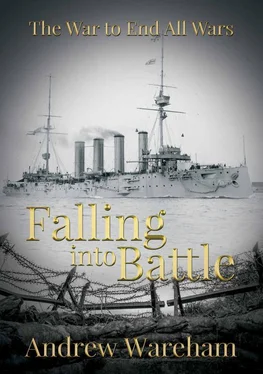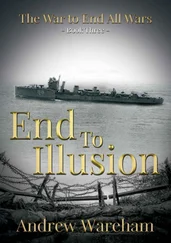“Refreshments, sir?”
“Just tea, please. Too much whisky forced on me already this morning.”
“Yes, sir. Sandwiches, sir?”
“What’s the time? Lost my watch, I’m afraid.”
“Coming up for eleven, sir. Due to sail on the hour, sir. We do try to maintain standards, sir. Dover for one o’clock, sir, possibly earlier, depending on the Navy.”
There was a train waiting at Dover, express to Charing Cross station. On reaching London the problem arose that Richard had no cash on him. He asked a porter for the route to walk to Gieves.
“Can’t take a cab. Lost my uniform with my money. Need to replace everything.”
The porter glanced at the ribbon – like many in his job, he was a Boer War veteran. The railway companies had made a point of employing ex-soldiers when possible.
“Yes, sir. Moment, sir. Stationmaster will deal with it, sir.”
The porter, ancient and bent-backed, dragged out of retirement on a company pittance to work again for little more, shuffled off to the hidden doors behind the ticket office. The stationmaster appeared, stared at Richard and focussed on the ribbon, new and bright.
“A cab to Gieves, sir? Certainly. Follow the porter, sir.”
Richard was amazed – stationmasters were normally distinguished primarily by their self-importance, not by any desire to serve the travelling public.
The cabbie listened to the porter and nodded.
“Get in, guv. Got your bags?”
“None. Lost the lot. I’ve got what I stand in, and the uniform was lent by another officer.”
“Fair enough. Saw your name in the paper. Better get you to Gieves quick, ain’t we?”
The tailors were equally obsequious, anxious to serve.
Richard thought that he might come to like the life as a decorated hero. He suspected that it might not last too long, but he might as well make the best of it until another man came along to take his place in the headlines.
“I am due at the Palace for Tuesday morning.”
“Our gentleman can present himself at the Bedford depot on Monday, sir. Any minor adjustments can be made then. Two sets of working uniform and parade dress then, sir. If necessary, you will present yourself for fittings on Tuesday afternoon, sir, then the remainder can be provided. For the moment, sir, we have your measurements and can work to them as normal. You will require a cab to St Pancras station, sir. I note, sir, that you are not carrying wallet or purse?”
“Lost everything in the field, I am afraid. My bank is in Kettering and I must make the best of my way there.”
“Banking hours being what they are, the branch will be closed before you reach Kettering, sir. Five sovereigns in cash, sir, will save you embarrassment on your journey.”
Richard protested that he did not like to take money in such a way.
“All part of our service, sir. Perfectly normal, sir. Four gold coins and a pound in silver, sir – you will not wish to ask change of a cabbie.”
The train was late and slow and reached Kettering well after the banks closed, as the tailor had foreseen. Richard took a cab home, much suspecting that he was about to cease to be the conquering hero.
His mother greeted him with some surprise. She did not read newspapers.
“I had thought you were in France, Richard.”
“I was, but I have been sent back to the depot to collect more men. I am also to go to the Palace on Tuesday.”
“The Palace? Which one, dear? Are they showing one of these new moving pictures?”
Richard’s elder sister intervened, as she often had to.
“Buckingham Palace, Mother! Richard has been awarded the Victoria Cross, so it said in the newspaper this morning. I told you that Captain Baker of the Bedfords had been distinguished.”
“So you did – but we know that Richard is only a lieutenant, so we agreed it could not be him.”
“He is a captain now – he has a captain’s stars on his shoulders.”
“So he has! How clever of you to see that, dear. What have you been doing, Richard, to be given a medal? Are you sure you should be taking such risks? I am told it can be quite dangerous, in wartime as well!”
“I am sure Richard did all that was necessary, Mother. Perhaps you should come and sit down now. We can discuss Richard’s doings over dinner.”
“Oh, yes. Tell cook to put up another plate, dear. Alexandra can do that, won’t you, dear.”
Richard’s younger sister trotted off to the kitchen, obediently.
Mrs Baker retired to her sitting room, leaving her elder daughter to deal with the bothersome details of her son’s return.
“Have you no baggage, Richard?”
“Lost everything in France, Vicky. The baggage train became separated from the battalion and was probably captured. I have what I stand in. I must report to depot in Bedford on Monday. There will be uniforms waiting for me I can wear civilian clothes till then.”
“Your wardrobe is untouched in your room. You look thinner but will be able to wear your old clothes.”
“Haven’t eaten much these last weeks in the retreat.”
“You have grown older, Richard. In the face, that is. Not a bad thing, I suspect.”
“Thank you, sister. When is Father due home?”
“For six o’clock, as always. We will eat for half past six, as normal. Mother will have a pot of tea in a few minutes.”
“I will join her – travelling since this morning and having to attend the tailors in London, haven’t had time to eat. No choice, but I shall have to beg Father to foot the tailor’s bill.”
“I expect he will pay up, Richard, the circumstances being out of the ordinary.”
“I hope so. What of you, sister? A young man in tow, perhaps?”
“No. Most of the young men have followed your example and have gone to war. Well, in fact, almost all are in some sort of training before they can go, but they are not here in Kettering. Alexandra has a follower, but Father hardly approves of him – he is a farming man, owns a thousand acres, in fact, quite large, but he is thirty years of age and not the sharpest of men. Father says that farms do not make money.”
“I don’t know – I have never been awake on the money-making side.”
“Nor me – but as a young lady, father says I should not be.”
Richard was waiting in the hall when his father entered. He had changed into his old civilian clothes.
“Back home - and looking more like a man. Was that you in the Telegraph this morning? Captain Baker, VC? I wondered… Didn’t think it was likely. Glad to be wrong, for once.”
“Yes, sir. Buckingham Palace on Tuesday, sir. Back to the depot on Monday and I shall take my company out to France on Friday. New men, of course.”
“So the paper said. Fewer than twenty men left out of eighty and you the sole officer surviving.”
“That’s right. Lucky to make it back, sir. I had a good sergeant and two of the local men came up trumps. Abbott and Ekins, both corporals and from boot and shoe factories locally.”
“Tell them there will be work with me if they survive the war, paying better.”
“Thank you. I would like that, Father. They are fine men.”
“What about you? Wearing your old clothes, I see.”
“No choice. I have one borrowed uniform. Had to go to Gieves in London to order up a full set to replace everything. Lost the lot when the baggage train disappeared. Wore the same clothes for weeks, and that included days fighting over slagheaps in the iron making area north of Ypres.”
“Filthy stuff, slag.”
“I noticed that, Father.”
“We’ll put you in your borrowed uniform for photographs. Local paper will want them. Good for the firm. Captain Baker, VC! Far more than ever I hoped for from you. Well done. I’ll put a thousand a year into your bank account, for life, boy. You’re worth more than that to me, now. Bound to be promoted, too. Stay as a soldier when the war ends, will you?”
Читать дальше












